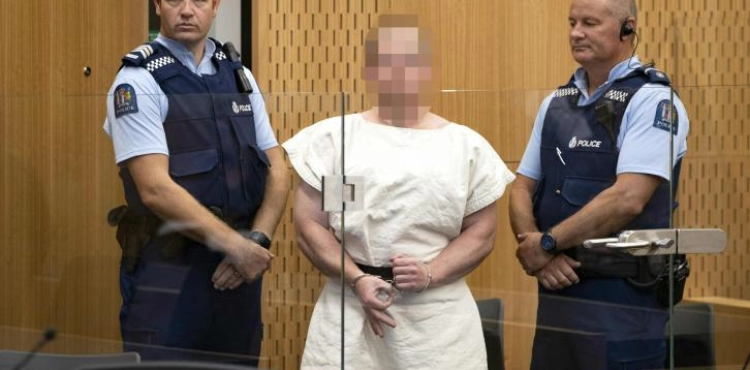Australian Brenton Tarant, 28, attacked two synagogues in Christchurch, New Zealand, on Saturday before a city court charged with murder, Digging the graves of the 49 victims.
The former fitness coach, a handcuffed and wearing a white shirt worn by detainees, heard the charge against him. He has not applied for bail and will remain in prison until his reappearance in court on 5 April.
Tarrant pointed his finger at the "Tammam" inverted, a reference used by white extremist groups around the world.
Outside the courthouse, Christchurch´s people are struggling to deal with the effects of what is believed to be the worst terrorist act targeting Muslims in the West.
Nearby, rigs were preparing a large area of ​​land to bury bodies of the victims, although police had not yet delivered the bodies.
In the district hospital, doctors work around the clock to treat the wounds of 39 people with gunshot wounds and other minor wounds.
The list of wounded includes a two-year-old boy and a four-year-old girl in critical condition.
The attack on Lynnwood and Alnor mosques has provoked unprecedented shock and shock in this peaceful country, which boasts of welcoming migrants fleeing violence and persecution.
On Saturday, people from all sectors of New Zealand flocked to police checkpoints around the Al-Nour Mosque, where the largest number of victims fell, expressing their respect and solidarity with the 50,000-strong Muslim community, about 1 percent of the island´s population.
The bouquets were accompanied by written letters expressing the sadness and disbelief of a city resident described by a local driver as a "city of sorrow".
"Sorry you were not safe here, our hearts are sad for your loss," said one of the letters placed amid the flowers.
As police removed the security cordon on Saturday night, passers-by spontaneously joined the two policemen in clearing the flowers near the mosque.
The imam, who led the prayers at the Linewood mosque, said the attack would not change Muslim love for New Zealand.
"It was a very bad day, not just for us, for all of New Zealand," said Ibrahim Abdel Halim. "We still love this country," he said, promising extremists would "never undermine our confidence."
Across the quiet island, citizens reacted to calls for cross-religious solidarity if millions of dollars were raised, donated halal food, and even volunteered to accompany Muslims who are now afraid to walk alone on the streets.
New Zealand Prime Minister Jacinda Ardenne arrived on Saturday wearing a black headdress to the city where she met survivors and victims´ families.
She said the victims were from across the Muslim world, noting that Turkey, Bangladesh, Indonesia and Malaysia had provided consular assistance.
A Saudi citizen and four Jordanian citizens were killed in the attack, while five Pakistani citizens were killed.
Sahira Ahmed, a New Zealand-born New Zealander, said she was touched by the prime minister´s visit.
"It means a lot," Ahmed told AFP. "It´s a sign that I´m talking to you."
Police are now trying to gather testimonies and details of the incident to answer the important question of why and how it happened.
The authorities want to know how the intelligence services have not been able to monitor the murderer despite the publication of extremist views.
"The attacker had a weapons license he got in November 2017," Ardenne told a news conference in Wellington before heading to Christchurch.
The 28-year-old man had bought two submachine guns, two hunting rifles and another weapon.
"Just because this person got a license and has weapons of this kind makes me say that people want that to change, and I will work on that change.
"I can tell you one thing, our laws on weapons will change," she said.
The attacker launched a racist "statement" on social networking sites before the attack was carried out. He seemed inspired by theories prevalent among the extreme right that "European peoples" were replaced by non-European immigrants.
The attacker carried online clips of the attack, where he was seen moving from one victim to another, shooting at wounded people who tried to escape.
Thirty-six minutes after receiving her first emergency call, Trent was in police custody.
Police Commissioner Mike Bush praised the "absolute courage" of police and citizens "who put themselves at risk" to stop the bomber.
The police charged with inciting an 18-year-old man while two were still in detention.
Australian police said they had visited the town of Grafton in northern Sydney where Trent had grown up and talked to members of his family as part of the investigation.
The attack raised questions about the seriousness of Western governments´ handling of the extreme right.












